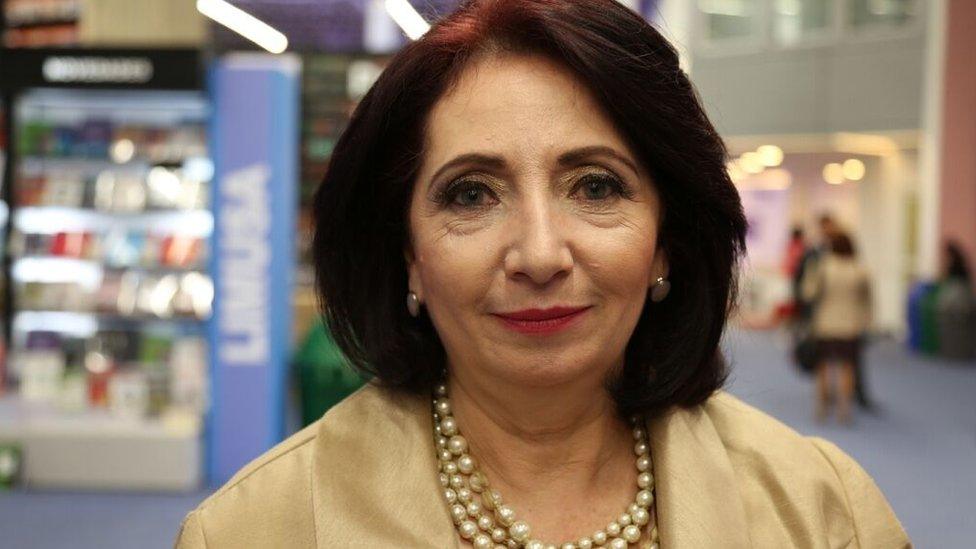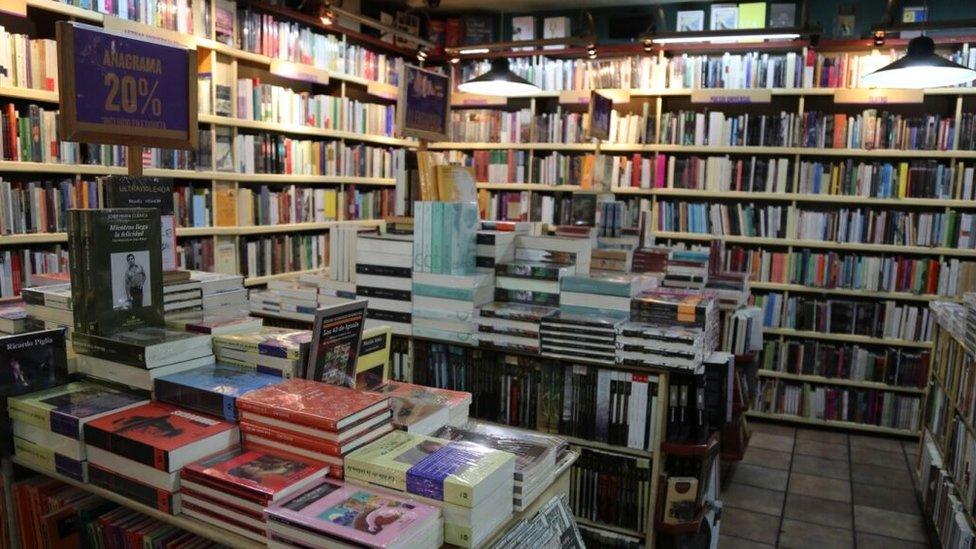Bookworms flock to Latin America's biggest literary fair
- Published

Guadalajara is one of the most important dates in international publishers' diaries
Bookworms have been filling the halls at Guadalajara's Expo this week.
The Guadalajara International Book Fair is 29 this year, and Mexico's second city has turned into one big library as it readies itself for more than 800,000 visitors.
After Frankfurt, Guadalajara is the most important date in international publishers' diaries.
"All of the editors, all of the publishers, all of the authors want to come here," says the fair's director, Marisol Schulz Manaut.
This year, the guest of honour is the UK, shining a spotlight on one of the oldest - and largest - publishing industries.
"We have people from Asia, from Europe, from all over the world coming every year to the book fair to do business. It's a huge exhibit of books - 400,000 titles in Spanish," says Ms Schulz Manaut.
Biggest booklovers

Marisol Schulz Manaut says the key task is to "promote reading among younger generations"
The region has a huge potential. It has a population of close to 600 million and, according to the United Nations, more than nine out of ten adults are literate.
But when it comes to getting people to sit down with a good book, that is still a struggle.
Recent figures from Mexico's National Council for Culture and Arts (Conaculta) showed that Chileans were the biggest booklovers in the region. They read, on average, 5.4 books a year. Mexicans follow closely with 5.3.
But that figure includes texts for school or work, so in terms of books read for pleasure that stands at just 3.5 books a year.
Compare that with the US where a recent survey by Pew Research Centre said Americans read 12 a year.
'Quiet revolution'

El Pendulo bookshops in Mexico City have survived the hard times
Even the fair's director acknowledges it is a problem.
"This is not really a country where people read. We have to do a lot of things and the same happens all over Latin America," says Ms Schulz Manaut. "We have to promote reading among younger generations."
Which is why there is a big focus on children's books at the fair. An entire separate hall is dedicated to children's activities and bookshops.
Low levels of reading are partly because of poor reading habits - but they are also a reflection of the region's economic divide.
"It's a problem of inequality and lack of education, but I think that is changing and you can see it from the numbers," says Marianne Ponsford, the director of the Regional Centre for the Book Promotion in Latin America and the Caribbean (Cerlalc).
"In the last 40 years this continent has boomed in an extraordinary way and culture has been at the centre stage of this quiet revolution."
But the boom does not always translate into growth.
Mexico's publishers' association (Caniem) reported this week that 143 million books were sold last year - down more than 3% from 2013. The value of the books sold also fell.
Coffee-book-shop
Bookshops in Mexico have been on the receiving end.
According to the Institute for Professional Development of Bookshops (Indeli), one in 10 bookshops closed between 2009 and 2014.
El Pendulo bookshops in Mexico City have survived the hard times. The small chain of six stores calls itself a "cafebreria" - or coffee-book-shop in English.
Its combination of not just offering books but food, music events and talks is popular with the capital's booklovers who come to browse. But it is not easy.
"The opening of bookshops in Latin America continues to be difficult," says El Pendulo's manager Rene Reyes.
"There are big gaps in the region because of the region's economies. In Mexico in particular most of the bookshops in the country are in the capital."
E-book fears
El Pendulo prides itself on offering people a place to come in, sit down and read a book. But for how long?
Spanish-language publishers are still not prepared to put all of their catalogue online. According to Cerlalc, just 21% of titles in the region are available in electronic form. So there is room for growth.
"In Mexico it's still unclear where it stands with online purchases," says Rene Reyes. "There is the demand. The issue more than anything is the lack of confidence when it comes to giving over your card details. Really, that's all it is."
But it is not. The other big problem is piracy - and that puts off publishers from investing in the region.
"Compared with some other places of the world it's bad," says Ana Maria Cabanellas, a publisher in Argentina and a former president of the International Publishers' Association.
"We have a big problem with piracy and also with exporting piracy. For example, Peru has a lot of piracy - but they don't only consume it in Peru, they export it to Bolivia, to Colombia, to Ecuador so your books are pirated in one place but this piracy is exported to other places."
Governments can - and do - play a huge role in encouraging reading. The purchase of text books for educational purposes makes up a huge part of the region's sales.
"I think the challenges have to do with politics in the region, with having governments who really care about education," says Ms Ponsford.
"We are more and more democratic as the years go by. But I think that is a challenge, to get public policy to be stronger than the governments that come and go."
- Published14 August 2015
